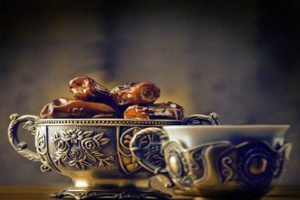
The Deen of Islam is a universal Deen. It is for all times, all places and all people. It is so complete, perfect and comprehensive that it has shown man the path of fulfilling the rights of Allah Ta‘ala and the rights of the servants.
Prior to a person entering the world until he passes away, Islam has prescribed laws and injunctions through which goodness will be acquired.
Let alone acts of worship which are a means of earning from the limitless treasures of Allah Ta‘ala, Islam has taught man a way to transform even his worldly activities into acts of ibaadah (worship) through which he will be able to please Allah Ta‘ala and become a source of mercy to mankind.
While in this world, every person needs to eat, drink, sleep, conduct business, socialize and fulfil other needs. However, through carrying out these mundane activities in accordance to the sunnah manner, one will be able to gain abundant reward and secure the proximity of Allah Ta‘ala and His beloved Rasul (sallallahu ‘alaihi wasallam).
Sunnats and Aadaab before Eating
1. Always consume halaal and wholesome food. Refrain from consuming doubtful or haraam food.[1]
2. Eat with the intention of gaining strength to fulfil the commands of Allah Ta‘ala and engage in His worship.[2]
3. One should sit on the floor and eat.[3]
4. Spread out a cloth (dastarkhaan) on the floor before eating.[4]
قيل لقتادة: فعلام كانوا يأكلون قال: على السفر (صحيح البخاري، الرقم: ٥٣٨٦)
Hazrat Qataadah (radhiyallahu ‘anhu) was asked, “What would they (i.e. Rasulullah (sallallahu ‘alaihi wasallam) and the Sahaabah (radhiyallahu ‘anhum)) eat upon?” Hazrat Qataadah (radhiyallahu ‘anhu) replied, “They used to eat on the dastarkhaan (cloth/mat spread out on the floor).”
5. Wash both hands up to the wrist before eating.[5]
عن ابن عباس عن النبي صلى الله عليه وسلم قال: الوضوء قبل الطعام وبعده مما ينفي الفقر وهو من سنن المرسلين (المعجم الأوسط للطبراني، الرقم: ٧١٦٦)[7]
Hazrat Abdullah bin Abbaas (radhiyallahu ‘anhuma) reports that Hazrat Rasulullah (sallallahu ‘alaihi wasallam) said, “Washing the hands before and after meals repels poverty, and it is from the sunnah of all the Ambiyaa (‘alaihimus salaam).”
6. It is better for one to remove his shoes before eating.
عن أنس بن مالك قال: قال رسول الله صلى الله عليه وسلم: إذا أكلتم الطعام فاخلعوا نعالكم فإنه أروح لأقدامكم (المعجم الأوسط، الرقم: ٣٢٠٢)[8]
Hazrat Anas (radhiyallahu ‘anhu) reports that Hazrat Rasulullah (sallallahu ‘alaihi wasallam) said, “When the food is placed (on the dastarkhaan – eating cloth – at the time of meals), then remove your shoes, as it will bring more comfort to your feet.”
7. Recite bismillah or the following dua before eating. If you are with your family, then you may recite the dua audibly to remind them.[9]
بِسْمِ اللهِ وَبَرَكَةِ اللهِ
In the name of Allah Ta‘ala, and with the blessings of Allah Ta‘ala.[10]
8. When eating, either sit with both knees on the ground (in the tashahhud posture), or sit with the right knee raised.[11]
9. Eat and drink with the right hand.[12]
عن أبي هريرة أن النبي صلى الله عليه وسلم قال: ليأكل أحدكم بيمينه وليشرب بيمينه (سنن ابن ماجة، الرقم: ٣٢٦٦)[13]
Hazrat Abu Hurairah (radhiyallahu ‘anhu) reports that Hazrat Rasulullah (sallallahu ‘alaihi wasallam) said, “When one of you eats or drinks, then he should eat with his right hand and drink with his right hand.”
[1] عن أبي هريرة قال: قال رسول الله صلى الله عليه وسلم: أيها الناس إن الله طيب لا يقبل إلا طيبا وإن الله أمر المؤمنين بما أمر به المرسلين فقال: يا أيها الرسل كلوا من الطيبات واعملوا صالحا إني بما تعملون عليم وقال: يا أيها الذين آمنوا كلوا من طيبات ما رزقناكمثم ذكر الرجل يطيل السفر أشعث أغبر يمد يديه إلى السماء يا رب يا رب ومطعمه حرام ومشربه حرام وملبسه حرام وغذي بالحرام فأنى يستجاب لذلك (صحيح مسلم، الرقم: ١٠١٥)
[2] سورة المؤمنون: ٥١، سنن الترمذي، الرقم: ٣٤٩١، وقال: هذا حديث حسن غريب
[3] فتاوى رحيميه ١٤١/١٠
[4] فتاوى رحيميه ١٤١/١٠
[5] قال نجم الأئمة البخاري وغيره غسل اليد الواحدة أو أصابع اليدين لا يكفي لسنة غسل اليدين قبل الطعام لأن المذكور غسل اليدين وذلك إلى الرسغ كذا في القنية (الفتاوى الهندية ٣٣٧/٥)
[6] وقال الهيثمي في مجمع الزوائد، الرقم: ٧٩١٣ فيه نهشل بن سعيد وهو متروك وقال شيخه الحافظ الزين العراقي كما نقله المناوي: نهشل ضعيف جدا والضحاك لم يسمع من ابن عباس وقال ولده الولي العراقي: سنده ضعيف لكن له شواهد وهي وإن كانت كلها ضعيفة كما قاله الحافظ المذكور لكنها تكسبه فضل قوة (فيض القدير ٣٧٦/٦)
A Beautiful Incident
A pious man narrated that he once owed a debt of three hundred rupees, and due to straitened circumstances, he could not imagine how he could ever be relieved of this burden.
One day, while seated in the discourse of an Aalim, he heard him say that the one who washes his hands before and after eating, with the intention of emulating the sunnah of Rasulullah (sallallahu ‘alaihi wasallam), will insha-Allah be relieved of his debts in a short span of time.
The pious man implemented the above sunnah, and through the grace of Allah Ta‘ala, he was absolved of all his debts in just a few days. (The Sublime Conduct of Nabi H 1/66)
[7] وقال الهيثمي في مجمع الزوائد، الرقم: ٧٩١٢ : رجال الطبراني ثقات إلا أن عقبة بن خالد السكوني لم أجد له من محمد بن الحارث سماعا
[8] وسنن الطعام البسملة في أوله والحمدلة في آخره (الفتاوى الهندية ٣٣٧/٥)
وإذا قلت بسم الله فارفع صوتك حتى تلقن من معك (رد المحتار ٣٤٠/٦)
[9] عن ابن عباس رضي الله عنهما أن النبي صلى الله عليه وسلم وأبا بكر وعمر رضي الله عنهما أتوا بيت أبي أيوب فلما أكلوا وشبعوا قال النبي صلى الله عليه وسلم: خبز ولحم وتمر وبسر ورطب إذا أصبتم مثل هذا فضربتم بأيديكم فكلوا بسم الله وبركة الله (المستدرك للحاكم، الرقم: ٧٠٨٤، وقال: هذا حديث صحيح الإسناد ولم يخرجاه، وقال الذهبي: صحيح)
[10] فالمستحب في صفة الجلوس للأكل أن يكون جاثيا على ركبتيه وظهور قدميه أو ينصب الرجل اليمنى ويجلس على اليسرى (عمدة القاري ٤٤/٢١)
احسن الفتاوى ٥٠/٩
[11] المواظبة لا تفيد السنية إلا إذا كانت على سبيل العبادة وأما إذا كانت على سبيل العادة فتفيد الاستحباب والندب لا السنية كلبس الثوب والأكل باليمين (البحر الرائق ٢٩/١)
[12] وقال البوصري في مصباح الزجاجة ١٠/٤ :هذا إسناد صحيح رجاله ثقات
 Ihyaaud Deen An Effort to Revive Deen in Totality
Ihyaaud Deen An Effort to Revive Deen in Totality



